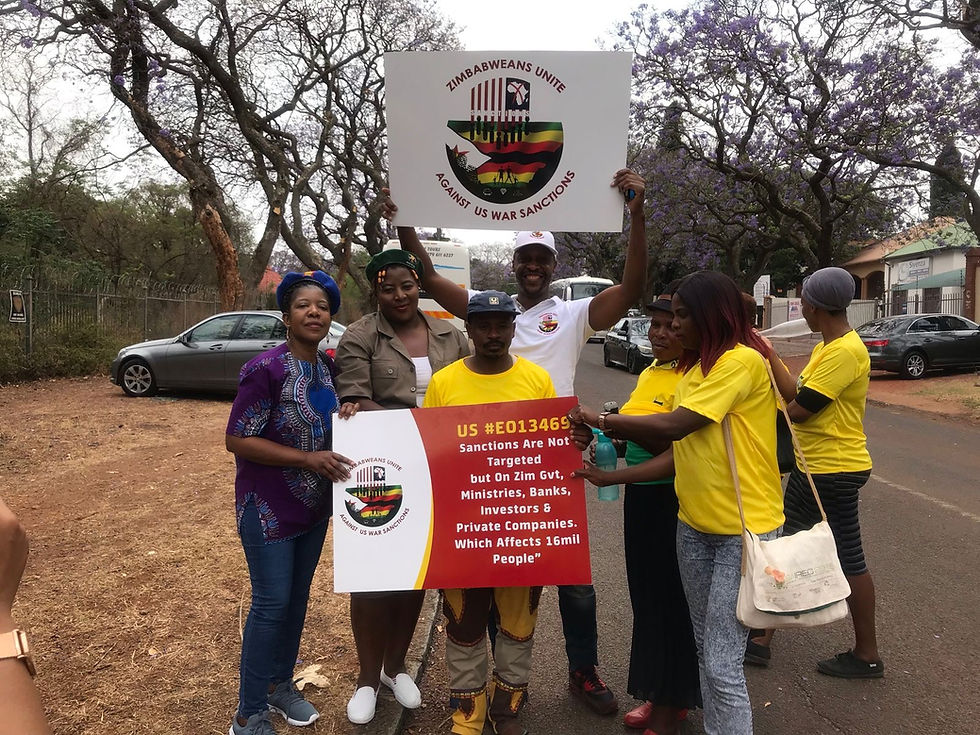𝗗𝗜𝗗 𝗥𝗨𝗧𝗘𝗡𝗗𝗢 𝗥𝗘𝗠𝗢𝗩𝗘 𝗦𝗔𝗡𝗖𝗧𝗜𝗢𝗡𝗦 𝗢𝗙𝗙 𝗭𝗜𝗠𝗕𝗔𝗕𝗪𝗘 𝗢𝗥 𝗗𝗜𝗗 𝗛𝗘 𝗟𝗜𝗘?
- rutendo matinyarare

- Oct 27, 2025
- 4 min read

Dentons, the world’s biggest law firm, writes: “on 4 March 2024, the U.S. President removed the entire Zimbabwe Sanctions Program”. This means all sanctions (the Zimbabwe Sanctions Program) on Zimbabwe — its government, parastatals, banks and citizens — were removed by the U.S. government on that date, opening up banking payment clearances, loans, export channels, duty-free export access into the EU, the right to import technology & software, releasing blocked financial assets and restoring corresponding banking relationships.
This has allowed direct payments from the diaspora and the west into Zimbabwean bank accounts, the reformation of correspondent banking partnerships, the importation of machinery & technology such as Starlink, and medical equipment — hence Parirenyatwa has repaired its radiotherapy machines through U.S. companies for cancer treatment. Companies like Edgars and David Whitehead have also retooled, contributing to manufacturing becoming Zimbabwe’s biggest GDP contributor, and catalyzing the economy to be the fastest growing in SADC at 6.5% in 2025 and 8.9% next year when Zimbabwe will be the second fastest economy in Africa.
To save face after being forced to remove its executive order sanctions or the Zimbabwe Sanctions Program, the U.S. imposed NEW sanctions under the Global Magnitsky Act on eight senior people in the country and three companies. These were NEW sanctions, not continuations of the former or removed ones. The problem with these sanctions is that they target individuals and not civilians as a whole; hence, they are difficult to fight through activism against sanctions on civilians. As a result, these sanctions require legal action by those affected, and not activism.
If we are honest, the sanctions remaining on the President, the First Lady, Vice President, Minister of Defense, Kuda Tagwirei, Obey Chimuka, Zimbabwe’s only billionairess Sandra Mupunga, Fossil Agro, Fossil Contracting, and Sakunda, suggest that the Ministry of Foreign Affairs and various political lobby groups created during Minister Shava’s administration, failed at political re-engagement, despite receiving huge resources from government to do that.
Meanwhile, civil society pressure and lobbying under organizations like ZASM succeeded in pushing for the removal of sanctions on civilians, all parastatals, banks and the government through legal court challenges, getting the UN Human Rights Council to denounce sanctions on Zimbabwe, getting the South African government to champion the fight against sanctions on Zimbabwe and convincing the U.S. Congress to undertake an impact assessment of their sanctions — which yielded a report in which the same Congress that called for sanctions, asked for their removal, acknowledging that they were hurting civilians.
These are hard facts to swallow, but it’s cause and effect. The sanctions on civilians, government, parastatals, and banks, which civil society fought through courts, lobbying, multilateralism, regionalism and civic activities, are gone. Meanwhile, new sanctions were imposed on political heads after political lobbying through re-engagement, didn’t quite hit the mark.
Why is this? Because when smaller countries fight politically against bigger powers, brinkmanship dictates that the superpower must win to save face and maintain its position in the geo-political chess board. However, a legal fight between a small nation and a superpower creates parity and equality between the parties at law, and under those conditions, the weaker party can overcome the stronger, often immoral superpower.
This is why since the formation of ZUAUWS (Zimbabweans Unite Against US War Sanctions) and ZASM (Zimbabwe Anti Sanctions Movement), we depoliticized the fight against sanctions and chose to make it a legal fight (based on human rights and international law) fought through multilateral institutions (UN, AU and SADC), to level the playing-field with the superpower west.
It is for this reason that the Americans are fighting to force South Africa to withdraw its case against Israel, because they know that the rulings against Israel diminish its political standing in the world and elevate South Africa’s as a moral authority. And I must say, the South Africans learned a lot and too a cue from our own fight against the Americans in their courts and through multilateral organisations.
Moral of the story: Magnitsky sanctions would be removed more easily if the individuals under those sanctions, firstly, wrote legal letters challenging their unilateral designations and eventually took legal action if the letters don’t yield results, because these sanctions amount to punishment without trial.
I must conclude by saying that, the prevailing anti-sanctions campaign against Magnitsky sanctions, sends a confusing message to investors and corresponding banks wanting to return to Zimbabwe. On one hand, they hear that sanctions on Zimbabwe are gone and they are free to do business in that country, only to be confused when they see Zimbabweans still marching against sanctions and the AU making statements as if Zimbabwe is still a country isolated by sanctions.
It’s like we are self-sabotaging. We need to be clearer in our communication by saying that executive order sanctions that were prohibiting trade with Zimbabwe, were removed, however, we are now fighting illegal Magnitsky sanctions that were levied upon our President and his most important ministers and advisors.
Written by Rutendo Matinyarare, the Chairman of ZASM.








![Reflecting on Mugabe's leadership with Rutendo Matinyerere[via torchbrowser.com]](https://static.wixstatic.com/media/bc543e_1f43fc03f32c421a886bfe7e89765b34f002.jpg/v1/fill/w_320,h_180,enc_auto/file.jpeg 1x, https://static.wixstatic.com/media/bc543e_1f43fc03f32c421a886bfe7e89765b34f002.jpg/v1/fill/w_640,h_360,enc_auto/file.jpeg 2x, https://static.wixstatic.com/media/bc543e_1f43fc03f32c421a886bfe7e89765b34f002.jpg/v1/fill/w_960,h_540,enc_auto/file.jpeg 3x)
![State of Zimbabwe economy under sanctions- Rutendo Matinyarare[via torchbrowser.com]](https://static.wixstatic.com/media/bc543e_9f02c3d9ed0d478f9fc73604d04dc3a9f002.jpg/v1/fill/w_320,h_180,enc_auto/file.jpeg 1x, https://static.wixstatic.com/media/bc543e_9f02c3d9ed0d478f9fc73604d04dc3a9f002.jpg/v1/fill/w_640,h_360,enc_auto/file.jpeg 2x, https://static.wixstatic.com/media/bc543e_9f02c3d9ed0d478f9fc73604d04dc3a9f002.jpg/v1/fill/w_960,h_540,enc_auto/file.jpeg 3x)





Comments